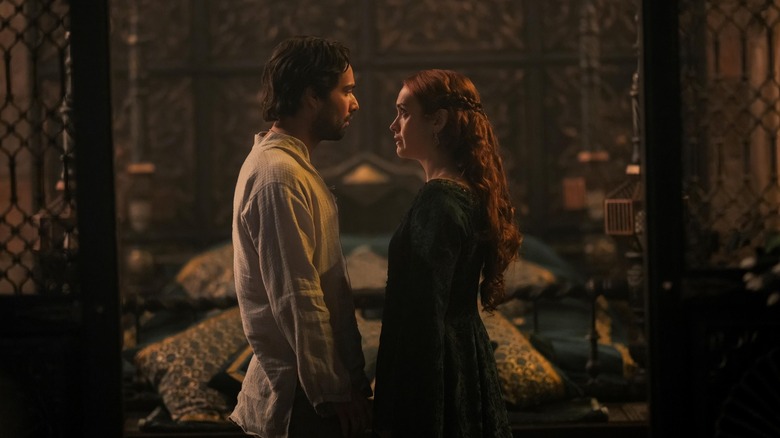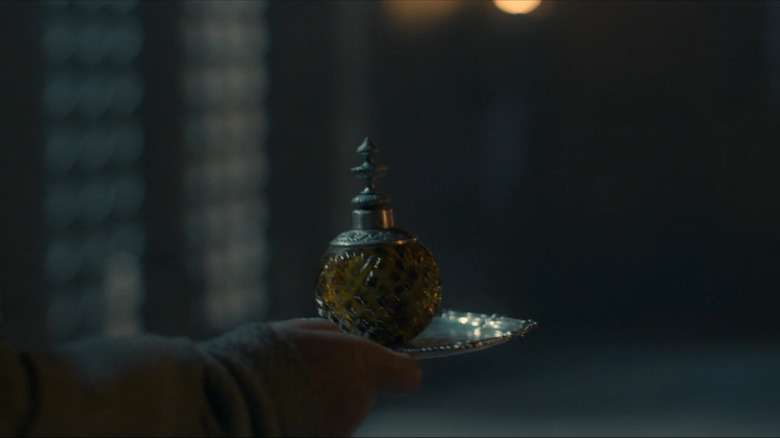Yep, We Need To Talk About The Tea Scene In House Of The Dragon Season 2
The following article contains spoilers for "House of the Dragon" season 2, episode 4.
Pregnancy can be a wonderful thing, but there are plenty of reasons why someone might not want to or be able to give birth. While it is morally just for all people to have access to safe and legal abortions, unfortunately, that's not the case in much of the world (including large swathes of the United States following the overturning of Roe v. Wade). It's also not the case in Westeros, the fantasy world of "House of the Dragon," where paternity is of utmost importance for some reason and anyone who can bear children is seen as a vessel for future sons. That leaves those in need of abortions with few options, and chief among them is moon tea.
In "House of the Dragon" season 2, we see Alicent (Olivia Cooke) asking the Grandmaester for moon tea, though she pretends that it is for someone else and she is just helping a friend. Moon tea has a complicated history in "House of the Dragon" and has its origins in real-world herbal remedies for unwanted pregnancies that can be both helpful and dangerous. In Alicent's case, the powerful brew may very well have saved her life.
A tea to cover up Alicent's dangerous dalliance
Though it has been quite a bit longer for audiences, it's only been a few weeks in "House of the Dragon" time since Alicent's husband King Viserys (Paddy Considine) went to the great joust in the sky. Alicent has been having an ongoing tryst with Lord Commander of the Kingsguard, Ser Criston Cole (Fabien Frankel), and it puts both of them in danger because both are supposed to be celibate and there's no way that she can pass off Cole's child as belonging to Viserys. After all, she watched as her son mercilessly mocked Rhaenyra's (Emma D'Arcy) children for being bastards sired by Ser Harwin Strong, and she knows those Targaryen genes (or lack of them) don't lie. Her tryst could be seen as treason, and if Cole was implicated he could face banishment to the Wall or worse. So while it's a bit hypocritical of her to use the tea when she once let Rhaenyra's use of the brew hurt their friendship, it's also pretty understandable. Not only that, but giving birth in Westeros can be a death sentence all by itself.
The maester tells her to let him know if "the recipient" needs any remedies for potential stomach upset caused by the tea and then he goes about his way. Later, we see her using the Westerosi version of a heating pad, holding warm coals wrapped in a bundle against her lower abdomen. She missed the small council meeting and looks like she's in some pain, going through the symptoms of an induced miscarriage. What's worse somehow is that she has to deal with Larys (Matthew Needham) during all of it.
Of course Larys knows what's up
Larys came to check on Alicent because she missed the small council meeting, and she says that she "indulged" too much in her supper the night before, though it's clear that the hyper-aware Larys knows exactly what's going on. He even tells her that it's important to indulge her appetites because they are what make a person feel alive, shortly before pointing out that Ser Criston is in very real danger of becoming a dragon snack at any time. The tiny attempt to provoke her doesn't get a response, because even if she's dealing with the physical pain and the emotional upheaval that can come with any kind of pregnancy termination, she's still one of the toughest, most level-headed power players in all of Westeros.
It's a shame that there isn't a magical way to deal with contraception and reproduction in the world of "House of the Dragon," but thankfully those in need still have moon tea as an option. Like many other things in the fictional worlds created by author George R. R. Martin, moon tea was inspired by our own world's long, complicated history.
Moon tea in our world
The moon tea that Alicent drinks and its effects mirror herbal remedies, often teas, used in our own world to induce miscarriage. These have been used for centuries to various effects, though it's important to note that some of the herbs can be extremely toxic in the wrong doses and can lead to death. Many of the herbs used in these teas are also used to stimulate menstruation and have other holistic properties, though they have not been widely studied in the medical and scientific community (and most herbalists with the knowledge aren't willing to talk about it). These medicinal teas are an underground secret still, just like they were in the medieval era that Martin draws inspiration from.
Fans of the grunge band Nirvana might recognize the song "Pennyroyal Tea," inspired by singer Kurt Cobain's friends trying to use a tea made from pennyroyal, a herb in the mint family, to induce abortions. (It's important to note that while pennyroyal is safe in small doses and has holistic uses beyond its abortive properties, pennyroyal oil, sold in aromatherapy shops, can kill you dead in even the tiniest amounts!)
In an ideal world, people would be able to have full bodily autonomy and have the proper care for all of their reproductive needs. But since neither our world nor Westeros are ideal places, there will sadly always have to be sketchy underground alternatives.



